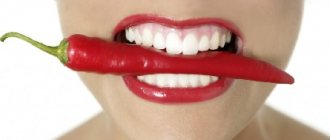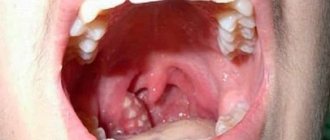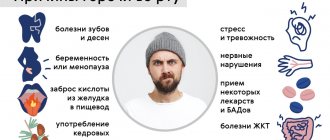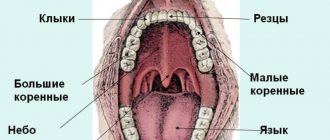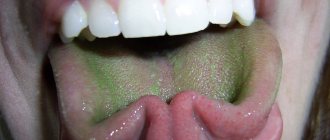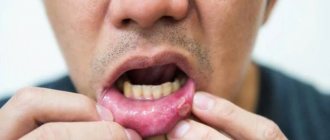Pathologies of the gastrointestinal tract are not uncommon in modern times. An incorrect daily routine, coupled with poor quality nutrition, are the main causes of stomach diseases. The symptoms and pathogenesis of such ailments are quite wide.
Some of them are manifested by abdominal pain, others by vomiting. In today's material, our resource decided to pay attention to the pathology manifested by bitterness in the mouth and nausea.
Where does the bitter taste come from?
An unpleasant taste may be present constantly or appear periodically. This symptom is associated with the release of bile into the esophagus. Patients often notice a bitter taste in the mouth in the morning, especially when eating fatty foods the day before and after sleeping on the left side.
Bile is a liver secretion that is involved in digestion. The fluid flows through the ducts into the gallbladder and from there into the duodenum. Normally, bile does not flow into the esophagus, and the person feels well.
After eating certain types of food, the liver may react by producing more secretions. The volume of bile in the intestines increases, and a small part enters the esophagus, causing a bitter taste in the mouth. The same reaction occurs when using certain medications or when exposed to other factors. In any case, an unpleasant taste is a reason to consult a doctor. Only by identifying the cause of bitterness in the mouth can a person’s well-being be improved.
Treatment of vomiting bile
Effective relief from attacks of bile vomiting depends entirely on successful treatment of the disease causing it.
Specialists at the Yauza Clinical Hospital will quickly identify the cause of the unpleasant symptom - vomiting bile. In a hospital setting, it is possible to carry out both conservative therapy and high-tech surgical treatment for most diseases that cause this unpleasant symptom.
You can see prices for services
Possible causes of bitterness in the mouth
Diseases of the biliary tract
Bile transport in the body is disrupted in chronic cholecystitis, cholelithiasis, biliary dyskinesia, hepatitis, and cirrhosis. Spasm or blockage of the duct leads to stagnation of secretions.
Important!
Bitterness in the mouth after eating can occur even after removal of the gallbladder. The reason is that bile is constantly produced in the body, and if a person does not adhere to a diet after surgery, some of the liquid may be thrown into the esophagus. You won’t be able to get rid of the bitter taste without following a diet.
Digestive system diseases
Diseases of the liver, esophagus, stomach, and intestines are accompanied not only by constant bitterness in the mouth, but also by other characteristic symptoms:
- nausea, vomiting;
- severe heartburn;
- belching;
- constipation or diarrhea;
- pain in the epigastric region.
The symptom of bitterness in the mouth can accompany giardiasis, gastritis, duodenitis, peptic ulcer, etc.
Other pathologies
Various oral conditions can cause a bitter taste:
- diseases of the tongue and gums: gingivitis, stomatitis, glossitis;
- insufficient oral hygiene;
- incorrectly installed fillings and dentures.
A bitter taste in the mouth may appear when taking certain anti-inflammatory, antihypertensive, anticonvulsant, hypnotics, and antibiotics. The same symptom is accompanied by poisoning with copper, mercury, lead, and the development of cancer pathologies. Severe bitterness in the mouth can be a reaction to taking herbal remedies: decoctions and infusions of herbs, nuts, sea buckthorn oil.
Nausea and vomiting during pregnancy
Nausea and vomiting are possible signs of pregnancy. In pregnant women, nausea usually occurs in the morning and is accompanied by slight dizziness, weakness, and drowsiness. Nausea and vomiting in pregnant women are symptoms of early gestosis (toxicosis). The occurrence of nausea and vomiting in a pregnant woman may be a sign of worsened pancreatitis, gastritis, gastric ulcer, treatment with iron supplements, therefore, in all cases of nausea and vomiting in pregnant women, this problem should be discussed with doctor.
What to do if you have a bitter taste in your mouth
The first thing you need to do is make an appointment with a gastroenterologist as soon as possible. The doctor will conduct a diagnosis and find out why bitterness and dry mouth occur and how to get rid of these sensations.
At the first consultation, the doctor interviews the patient. It is necessary to establish the period of maximum manifestation of symptoms. For example, increased bitterness in the mouth after eating may indicate overeating or disease of the bile ducts. If an alarming sign appears after taking medications, then most likely there is a violation of the intestinal microflora or a negative reaction of the liver. Bitterness in the mouth can occur in the morning or evening, after drinking alcohol, physical activity, and be accompanied by dry mucous membranes. All manifestations must be reported to your doctor.
Treatment of food poisoning
First of all, to restore the body, you need dietary nutrition, which will help restore normal functioning of the gastrointestinal tract (GIT).
When resuming nutrition after poisoning, general recommendations must be followed3:
- You need to eat often and in small portions.
- Fried, stewed, spicy, salty and fatty foods are strictly prohibited.
- Alcohol and carbonated sweet drinks should be forgotten during treatment and further recovery.
- It is important to maintain the serving temperature of the food - it should remain neutral - neither cold nor hot.
- The predominant cooking method is boiling and steaming.
- Dishes should be light, mostly lean and familiar to the body.
A home or traveler's first aid kit should always include anti-poisoning medications.
The most popular products3,4:
- Adsorbent preparations or sorbents. No first aid kit should be without such a product. The task of the sorbent is to absorb the toxin and its further removal from the body.
- Drugs to improve digestion. They help the body fully absorb food and will be especially relevant after defeating poisoning.
- Antispasmodics or painkillers. Spasms and pain in the stomach or intestines can also be the body’s reaction to an external “attack”. The task of such medications is to relax the internal muscles and relieve spasms, as a result of which the pain goes away.
When faced with food poisoning, it is first of all important to cope with the acute period of the problem, but it is equally important to think about the period of rehabilitation of the digestive system, because the inflammatory process disrupts its normal functioning. One of the consequences of such a disorder may be a lack of digestive enzymes, which are responsible for the breakdown and absorption of food in the body. As a result, the body experiences a deficiency of nutrients, and a person, even after recovery, may still experience unpleasant symptoms for some time - discomfort in the abdomen, heaviness after eating, periodic bowel movements, etc.
Pancreatin enzyme preparations may be useful to maintain digestion after poisoning5. They are called enzymatic because they contain digestive enzymes identical to those produced by the body and are included in the standard treatment of foodborne infections6.
Digestive enzymes are a special type of compound designed to break down carbohydrates, proteins and fats for subsequent absorption in the body.
Expert advice
When there is bitterness in the mouth, self-medication is the most dangerous. It is believed that the main cause of the symptom is liver disease. Patients begin to make compresses on their own and drink herbal decoctions. Instead of relief, complications occur. The patient is sent to the hospital with severe pain, intoxication, peritonitis, etc. These are the consequences of trying to make an independent diagnosis. It turns out that the cause of the bitterness in the mouth was gallstones. A person independently drinks choleretic decoctions, stimulates the migration of stones, which safely get stuck in the duct and cause an acute attack. Instead of having the crystals crushed under medical supervision, the patient goes straight to the operating table.
Dzhgarkava Tea Gochaevna
Therapist-cardiologist Experience 5 years
There are other, no less dangerous cases. To get rid of bitterness in your mouth, you need to go to the doctor and cure the detected diseases. This is the only right decision.
Vomiting in children
Vomiting
occurs more often in children than in adults because the structures in their stomach and brain that prevent food from being expelled through the mouth are not fully developed. In a child, any infections, including ENT organs, fever, rotavirus infection, food poisoning can cause nausea and vomiting. In addition, children are more emotionally sensitive, so often a child’s vomiting can be associated with a dislike for a particular food that has unpleasant memories associated with it. In newborn babies, vomiting should not be confused with regurgitation. A healthy child normally regurgitates 5-10 ml of stomach contents several times a day; regurgitation is associated with food intake and can be a sign of overeating, and can also occur as a result of rapid feeding and swallowing air. However, if the child regurgitates too often and is accompanied by the expulsion of a large amount of stomach contents (vomiting), the baby is not gaining weight well - you should show the child to the doctor, as this may be a symptom of stenosis of the esophagus or pylorus. In older children, vomiting may occur as a result of acute appendicitis or gastroenteritis, in which case the child experiences vomiting and diarrhea with fever and severe abdominal pain. Vomiting, fussiness, a crying baby, no bowel movements, or jelly-like, raspberry-colored stools may indicate intussusception (intestinal obstruction), which is an emergency. Worms can be a common cause of periodic nausea and vomiting in children. In all cases of episodic nausea and vomiting, a child should have a stool test for parasite eggs and, if necessary, undergo treatment. Migraine in children can cause recurrent bouts of vomiting. It is important to note that, unlike adults, migraine in children does not always manifest itself as a headache and for a long time can only manifest itself as episodes of vomiting or dizziness. Nausea and vomiting can occur in girls during the period of menstruation.
Attention!
Call a doctor if:
- Nausea or vomiting occurs several times and you do not know what is causing these symptoms.
- If you suspect that the cause of nausea may be food poisoning, try to give your child a gastric lavage before the doctor arrives.
- If nausea and vomiting occur in a child after a fall or injury (especially head and abdominal injuries).
- Nausea and vomiting in a child is accompanied by one or more of the following symptoms: headache, drowsiness, agitation, diarrhea, loss of consciousness, progressive deterioration of the child’s condition.
- Nausea and vomiting periodically recur in a child for no apparent reason.
Treatment methods: which ones can be used
To relieve symptoms after binge drinking, two treatment methods are used - medication and folk remedies.
Medicines - help after a binge
To improve their well-being, they buy medications that are presented in pharmacy chains by domestic and foreign manufacturers. The fastest-acting adsorbents that remove harmful substances from the body are Activated carbon and Linex.
Did you know? A shock dose of sorbents helps get rid of toxins quite quickly.
Biotredin and Metadoxil will help relieve hangover. To stop vomiting, it is enough to purchase Cerucal.
Note! Before taking the medicine, you need to read the instructions and not exceed permissible limits.
If the condition does not improve after taking medications, then you will have to put on an IV. To do this, you need to call an ambulance or contact a narcologist.
What does traditional medicine say?
Have you heard the words from a loved one: “I’m vomiting bile after drinking alcohol”? Then folk remedies are unlikely to save you, so there is no point in wasting time; it is better to contact a narcologist. If there are only remnants of food and drink in the vomit, this is the case when traditional medicine will come to the rescue.
- Drink with mint
To prepare a drug that helps alleviate the patient’s condition, use pharmacy or fresh leaves of regular mint (as an alternative, you can use lemon balm). For 200 grams of boiled water, a couple of fresh leaves or 2 grams are enough. dried. The leaves are filled with water, wrapped well and left for 7 hours. To rinse the stomach and alleviate the condition, drink tea in small sips. You can alternate the mint drink with clean water.
- Ginger decoction
To prepare a healing drink, just grind 2 grams. ginger root and brew it in 200 ml of boiling water. It is better to infuse the drink in a thermos. If it is not in the house, the dishes must be well wrapped and left for 15 minutes. Drink the drink warm. Most often, one glass is enough.
- Homemade lemonade
To prepare the drink you need to buy 1 lemon and take 0.5 liters of water. The juice is squeezed into slightly warmed water and drunk. If this amount is not enough, you can again prepare homemade lemonade and drink it at intervals of 15 minutes.
When preparing tea, lemonade or decoction, do not use flavorings or sugar. At this time, there is no need to encourage the body to produce bile. The task is to restore the required volume of fluid.
Why is vomit green?
The standard signs poisoning are familiar to all medical workers, and the first of them is the green color of vomit. It occurs for two reasons:
- there is excess bilirubin in the blood;
- there was a release of liquid secretion into the stomach.
Both the first and second reasons are what uncontrolled drinking leads to. That is, poisoning occurs. If you feel sick with bile after drinking alcohol, your loved one can be helped at home or taken to a medical facility. People with chronic or serious gastrointestinal tract diagnoses at great risk After ethanol poisoning, they may experience complications that will have a bad effect on their future health.
A man or woman vomits bile after drinking alcohol: what to do
Gastric lavage is the primary measure in case of poisoning. To cleanse the body, it is enough to drink 2 liters of clean water. But (!) this is provided that the person has not previously suffered a myocardial infarction and does not suffer from chronic diseases of the gastrointestinal tract or high blood pressure. Do not add any sweeteners or other ingredients to the water. The procedure is best performed in a sitting or standing position. In a difficult situation, cleansing is carried out on the side.
After gastric lavage, it is necessary to cleanse the intestines. An enema with warm water is used for this purpose. Using this procedure, it is possible to relieve pain and minimize the presence of toxins in the body. If bloating was observed, it will stop after the enema.
Note! The water temperature should be +35C.
Once the toxins are released, it's time to rehydrate. To do this, it is enough to drink small sips. clean (you can use mineral water, but still) water every 25 minutes.
If health does not improve, the patient should be placed on his side and allowed to fall asleep. In such a situation, you should not make sudden movements or lift weights. This will have a bad effect on your well-being.
As soon as the person wakes up and his condition improves, he can be offered chicken broth or oatmeal. After a couple of hours he can eat light soups.
Prevention
To avoid discomfort, it is recommended, first of all, to make adjustments to your own diet and diet. So, it is better to give up sweets, baked goods, fatty and fried foods, alcohol, as well as products containing large amounts of dyes, preservatives and other synthetic additives. The daily menu should be filled with fiber, cereals, lean fish, meat, vegetable broths - such a diet will restore the “affected” functions of the gastrointestinal tract as soon as possible.
Since a bitter taste in the mouth often “haunts” smokers and those who abuse alcohol, giving up bad habits is also on the list of mandatory preventive measures. The daily fluid intake (pure water, natural juices, fresh compotes, fruit drinks) should be 2–2.5 liters. This will ensure healthy functioning of the digestive tract and have a positive effect on metabolism in general.
To combat nausea and bitterness, patients are prescribed a diet, symptomatic drug treatment, and, if indicated, surgery.
Timely treatment of chronic and acute diseases (primarily infectious lesions of the oral cavity, upper respiratory tract, gastrointestinal tract) will also prevent the occurrence of discomfort. Due to the fact that nausea and bitterness in the mouth can have not only physiological (overeating, pregnancy, intoxication), but also pathological causes (diseases of the liver and other digestive organs, dental problems), if discomfort persists for a long time, you should seek help from a doctor , be examined and undergo appropriate treatment.
